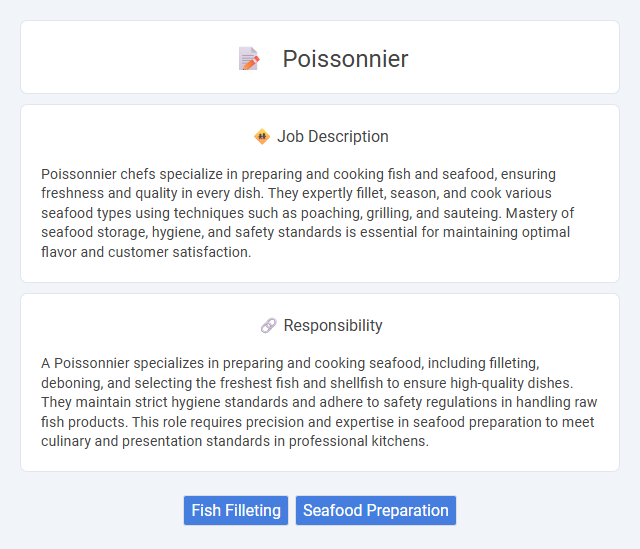
Poissonnier chefs specialize in preparing and cooking fish and seafood, ensuring freshness and quality in every dish. They expertly fillet, season, and cook various seafood types using techniques such as poaching, grilling, and sauteing. Mastery of seafood storage, hygiene, and safety standards is essential for maintaining optimal flavor and customer satisfaction.
People with physical stamina and good hand-eye coordination will likely be well-suited for a Poissonnier position, as the role often involves handling fresh seafood, working in cold environments, and performing repetitive tasks. Those comfortable with standing for long periods and possessing attention to detail for quality control may find this job fitting. However, individuals sensitive to cold or prone to repetitive strain injuries might find the conditions challenging.
Qualification
A Poissonnier must possess specialized qualifications in seafood preparation, including proficiency in filleting, scaling, and portioning various fish and shellfish. Formal culinary training or certification in seafood handling ensures adherence to safety and hygiene standards critical in professional kitchens. Expertise in freshness assessment, storage techniques, and knowledge of seasonal fish varieties enhances efficiency and product quality.
Responsibility
A Poissonnier specializes in preparing and cooking seafood, including filleting, deboning, and selecting the freshest fish and shellfish to ensure high-quality dishes. They maintain strict hygiene standards and adhere to safety regulations in handling raw fish products. This role requires precision and expertise in seafood preparation to meet culinary and presentation standards in professional kitchens.
Benefit
Working as a poissonnier likely offers the benefit of acquiring specialized skills in fish preparation and handling, which can enhance employability in the culinary field. There is a strong probability of gaining knowledge about various seafood types, improving both professional expertise and culinary creativity. The role may also provide opportunities to work closely with chefs and restaurateurs, potentially leading to career advancement.
Challenge
The Poissonnier role likely involves considerable challenges, including the need to maintain high standards of seafood quality and freshness under tight time constraints. Handling live or fresh fish requires specialized skills and attention to hygiene, which can be physically demanding and mentally taxing. Navigating the complexities of inventory management and adapting to variable daily supplies may further test problem-solving abilities in this position.
Career Advancement
A Poissonnier, specialized in preparing seafood in culinary environments, can advance to roles such as Head Chef or Executive Chef by mastering fish selection, filleting, and presentation techniques. Gaining expertise in seafood sourcing, storage, and menu development enhances opportunities in luxury hotels, seafood restaurants, and catering companies. Professional certifications and experience in high-demand kitchens accelerate career growth and increase earning potential in the culinary industry.
Key Terms
Fish Filleting
Poissonnier jobs specialize in fish filleting, requiring precision in removing bones and skin while preserving the freshness and quality of seafood. Expertise in handling various fish species and using sharp filleting knives ensures minimal waste and maximum yield. Efficiency and hygiene are critical to maintain food safety standards and deliver high-quality fillets for retail or culinary use.
Seafood Preparation
Poissonnier jobs concentrate on the meticulous handling and preparation of seafood, ensuring freshness and quality for retail or culinary use. Expertise in filleting, cleaning, and portioning fish and shellfish is essential to maintain optimal taste and safety standards. Knowledge of seafood storage, seasonal availability, and sustainable sourcing methods contributes to efficient inventory management and customer satisfaction.
 kuljobs.com
kuljobs.com